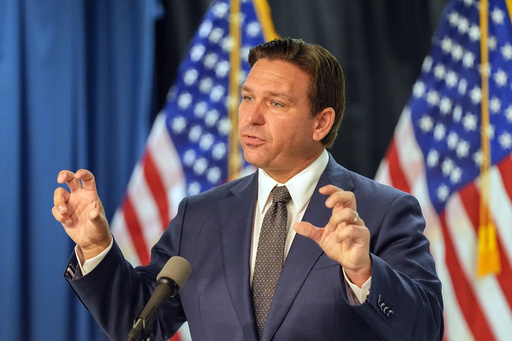
WEST PALM BEACH, Fla. — The recent hurricanes in Florida are posing challenges for voters in affected regions as they prepare for the upcoming election, unless Governor Ron DeSantis opts to relax and modify existing regulations, according to a letter from county election supervisors to state officials.
In a comprehensive six-page correspondence sent on Tuesday from the association of election supervisors to Florida Secretary of State Cord Byrd, who oversees the election process in the state, the group reported that Hurricanes Helene and Milton have significantly damaged polling locations and left numerous employees, voters, and poll workers without homes.
The most severely impacted counties are primarily located along the Gulf Coast, where extensive damage was incurred from both storms. David Ramba, the Association’s Executive Director, proposed ten adjustments for DeSantis, which include allowing extended time to establish early voting and drop box locations, offering voters more flexibility in their mail-in ballot requests, and lifting training requirements for certain poll workers. State law enables the governor to modify electoral procedures in the aftermath of hurricanes and other natural calamities.
This election cycle is expected to draw a large voter turnout, as residents will be casting ballots for presidential and Senate races, along with propositions that seek to legalize marijuana and repeal the state’s newly established six-week abortion ban. Early voting is set to commence on Monday in some Florida counties, and the majority of mail-in ballots have already been dispatched. Voters have until next week to request a mail-in ballot.
Ryan Cox, deputy to Ramba, mentioned that county election supervisors would be capable of securing polling places and facilitating the voting process if provided with some degree of flexibility. Historically, Florida has faced criticism for its electoral issues, especially during the 2000 presidential recount; however, elections in 2020 and 2022 were conducted with minimal complications.
According to Cox, the supervisors possess the necessary skills to navigate challenges as they arise. “They are remarkably effective in making prompt decisions and adjusting their plans to ensure every individual who wishes to vote has the opportunity,” he stated.
The letter highlighted several counties that suffered “substantial damage” due to Hurricanes Helene and Milton, notably those in proximity to Tampa Bay, such as Sarasota, Manatee, Pinellas, and Pasco. It also indicated that numerous polling locations have been “destroyed or made inaccessible because of flooding and structural damage.”
There was no response from Byrd’s office on Wednesday regarding potential flexibility or accommodations for the electoral process. Byrd is appointed by DeSantis.
In the aftermath of Hurricane Helene, DeSantis did enact an executive order permitting counties to alter early voting locations and relax restrictions on mail-in ballots. Nevertheless, he denied the supervisors’ request to extend the voter registration deadline of October 7, asserting that some areas were still in the cleanup stage from Helene while simultaneously prepping for Hurricane Milton.
Amy Keith, the executive director for Common Cause in Florida, expressed concerns about the impact of the storms on the upcoming election and mentioned that her organization, along with other advocacy groups, sent a letter to DeSantis and Byrd requesting an extension of the registration deadline and adjusting voting protocols in the impacted areas.
“I am gravely worried that this election cycle will pose significant complications for voters and their families who are still trying to recover from the devastation wrought by these record-setting storms,” stated Keith.
